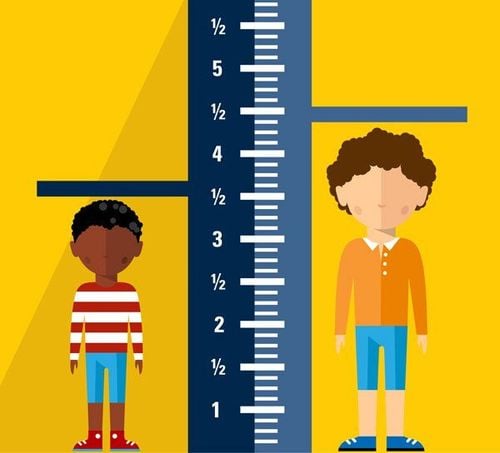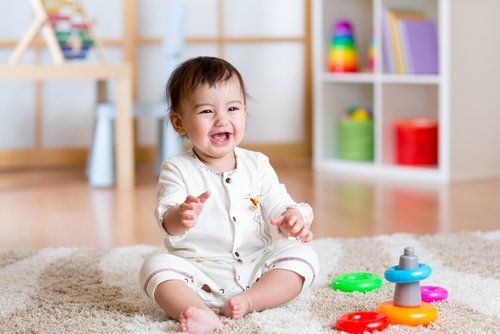This is an automatically translated article.
The article is professionally consulted by Master, Doctor Phan Ngoc Hai - Department of Pediatrics - Neonatology - Vinmec Danang International General Hospital.1. Sleep in a 15-month-old baby
A 15-month-old baby usually sleeps about 14 hours a day, which includes an 11-12 hour nap plus one or two naps. At this point your baby should be able to sleep soundly and sleep better, but there are times when she will cry and react when you put her to bed and leave her alone. You should not stay and put the baby to sleep, if you do not want to do this for months later. You can help your child by leaving a favorite toy (for example, a teddy bear) for them to sleep with, and more importantly, establish a bedtime routine for your child every day and create a safe space. cozy and comfortable so that children can fall asleep naturally.Trắc nghiệm: Sự phát triển tinh thần, vận động của bé thế nào là đúng chuẩn?
Khi nào bé biết nói, biết hóng chuyện hay biết cầm cốc là "đúng chuẩn"? Điểm xem bạn biết được bao nhiêu mốc phát triển tinh thần, vận động "đúng chuẩn" của bé nhé!The following content is prepared under supervision of Thạc sĩ, Bác sĩ y khoa, Ma Văn Thấm , Nhi , Phòng khám Đa khoa Quốc tế Vinmec Dương Đông(Phú Quốc)
2. Nutritional care for 15-month-old children
According to the standards of the World Health Organization, the average height and weight of a 15-month-old baby is:15-month-old girls: The average height should reach 77.5cm. Average weight reached 9.6 kg. 15-month-old boys: The average height should reach 79.1cm. Average weight reached 10.3 kg.

Sometimes a child will eat only one food on the plate and not eat the rest, or he or she may love one food very much one week and then another. Such food preferences are common in children of this age, so it is important that mothers always provide their children with a nutritious, well-balanced diet that contains starches, proteins, and other nutrients. fruits and vegetables and should not give children too many sweets and soft drinks.
3. Development in a 15-month-old baby
3.1 Moving A 15-month-old can walk a few steps without help. Children often spread their arms wide to keep balance when walking. At this age babies can also get to their knees with little or no support. You also do not need to be too worried if your baby is still crawling or dragging without learning to walk at this age. What needs to be taken care of now is to create a "safe house" for your baby to exercise and move around.3.2 Senses, Communication, and Emotions You may find that in the past 4 or 5 months your baby has become more attached to you or anxious when you are away and shy with strangers. Your child may also become jealous of other children or siblings when sharing your concerns, or protest when being told to go to bed on time. “Separation anxiety disorder” is also common in children this age.

Children at this stage are learning to speak and can say 2-10 basic words. Some words may not be said very clearly. There are also children at this stage who have not yet said a word, this is very normal and you do not need to be too worried.
Make sure your baby is learning a few new words every week, whether he can actually say it or not. Each child at this stage will tell you what he or she needs using a variety of gestures such as: pointing, pushing, pulling, throwing, laughing and kicking...
4. Activities and games to help your 15-month-old baby develop
Give and receive games they enjoy. Picture books: Your baby will enjoy looking at and turning the pages. Push-pull toys: Push-pull toys that are quite heavy are often used as fulcrums for children and children can move around the house. Building block toys: Wooden blocks that are light but large enough for children to stack up into a tall block. The thing that the child is most excited about is that after finishing the arrangement, he will push the wooden block to fall. Play with crayons and cleanable paper: Let your child freely scribble on the pages.
5. Milestones for a 15-month-old baby
Go independently. Say a few recognizable words. Point to the objects your child wants you to get. Build towers of two or more cubes. Play with other young people but do not have many skills to communicate and interact. Take a pencil and scribble on the paper. At the age of 15 months, babies have outstanding development in language, cognition, emotion, and movement. Therefore, parents should pay attention to the child's behavior to soon detect psychological problems, language disorders, autism. Don't forget to teach your baby to take good care of their teeth to prepare for the arrival of healthy permanent teeth.To help a 15-month-old child develop the best intellectual, emotional and physical development, parents should supplement their children with supportive products containing lysine, essential micro-minerals and vitamins such as zinc, chromium, selenium, vitamin B group helps to fully meet the nutritional needs of children. At the same time, these essential vitamins also support digestion, enhance nutrient absorption, help children eat well, and develop comprehensively.
Please regularly visit Vinmec.com website and update useful information to take care of your baby and family.
Reference source: emmasdiary.co.uk















